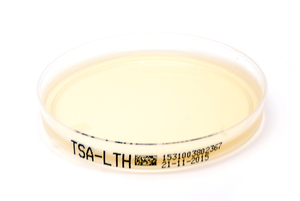Caseinpepton-Sojamehlpepton-Agar mit LTH (TSA-LTH)
Recommended by the Harmonised European Pharmacopoeia, supplemented with Lecithin, Polysorbate 80 (Tween 80) and L-Histidine
| Abbreviazione: | TSA-LTH |
| Numero articolo: | 40-1531 |
| Scheda: | Petri Dish, 90mm |
| Colore: | Yellowish |
| Condizioni di stoccaggio prodotti: | Dry, in closed bag at 15 – 22°C. |
| Data di scadenza: | 6 Months |
| Valore pH: | 7.3 ± 0.2 at 25°C |

Tryptone Soya Agar is used for the microbiological examination of non-sterile products. It contains two peptones, which support the growth of a wide variety of organisms. It is suitable for the cultivation of both aerobic and anaerobic bacteria. The later is grown either in deep cultures or by incubation under anaerobic conditions as well as yeasts and moulds.
The high number of microorganisms detectable using Tryptone Soya Agar is due to the addition of peptones gained from enzumatic hydrolysis of casein protein and soya proteins. It includes: the detection of Listeria spp, Pasteurella spp, Vibrio spp, Haemophilus vaginalis or Candida spp.
Tryptone Soya Agar contains no carbohydrates, so it can be used in the investigation of haemolytic reactions. The Pharmacopeia European (PhEur) recommends TSA for the enumeration of Total Viable Count in products under examination for microbial load.
The addition of Lecithin, Tween 80 and Histidine components neutralise the inhibotory effects of aldehydes, phenols, Hexachlorophene, chlorhexidine, formaldehyde and quarternary ammonium compounds used for preservatives, cleaning and disinfection agents.
| in g per 1 litre of Nutrient medium | |
|---|---|
| Pancreatic-digest of Casein Peptone | 15.0 |
| Enzyme-digest of Soya Bean Pepton | 5.0 |
| Sodium Chloride | 5.0 |
| Lecithin | 0.7 |
| Tween 80 | 5.0 |
| L-Histidine | 0.5 |
| Agar | 15.0 |
| *Adjusted as required to meet performance standards |
The Microbiological Performance Test is carried out in accordance with the requirements of PhEur. (Microbiological Examination of Non-Sterile Products in accordance with Chapter 2.6.13).
Productivity
Incubation conditions: 2–3 days at 30–35°C; Inoculum concentration: 10–100 CFU
| Organism | Type Strain | Specification | Colony morphology | |
|---|---|---|---|---|
| Staphylococcus aureus | ATCC 6538 / WDCM 00032 | 50–200 % | Medium, slightly yellowish colonies | |
| Pseudomonas aeruginosa | ATCC 9027 / WDCM 00026 | 50–200 % | Medium, slightly yellowish colonies | |
| Bacillus subtilis | ATCC 6633 / WDCM 00003 | 50–200 % | Large, flat, dry, irregularly shaped colonies | |
| Candida albicans | ATCC 10231 / WDCM 00054 | 50–200 % | Small, white, dry colonies | |
| Aspergillus brasiliensis | ATCC 16404 / WDCM 00053 | 50–200 % | Dark brown to black conidia on light mycelium | |
| Candida albicans (3–5 days at 20–25°C) | ATCC 10231 / WDCM 00054 | 50–200 % | Small, white, dry colonies | |
| Aspergillus brasiliensis (3–5 days at 20–25 °C) | ATCC 16404 / WDCM 00053 | 50 – 200 % | Dark brown to black conidia on light mycelium |
Microbial contamination
Incubation conditions: 5–7 days at 20–25°C and 5–7 days at 30–35 °C
| Specification |
|---|
| No growth present |
